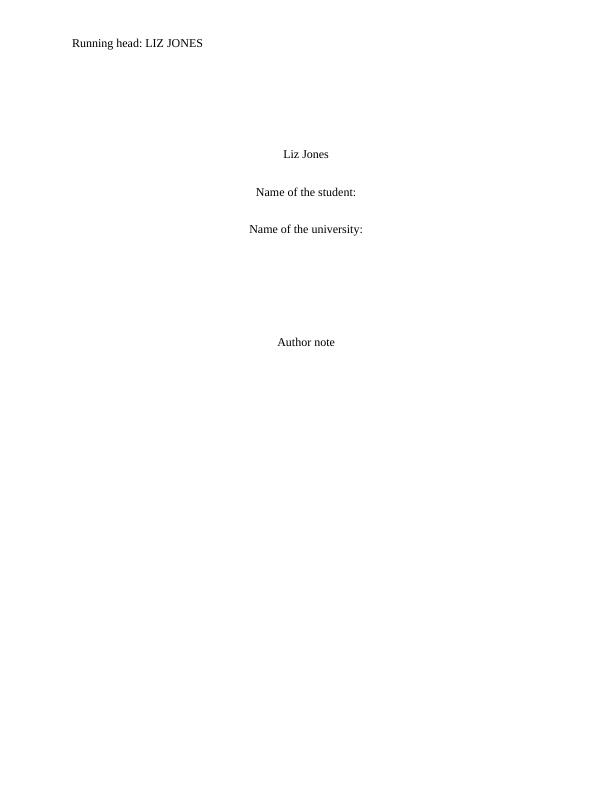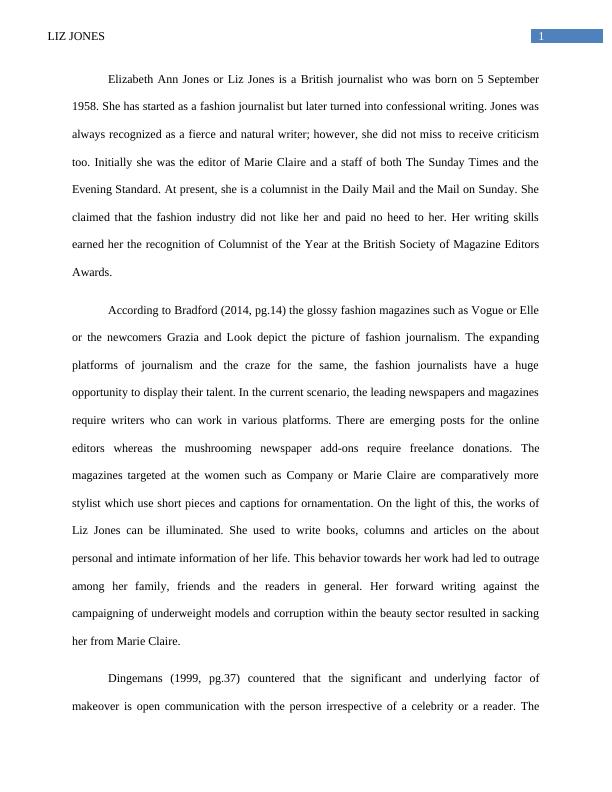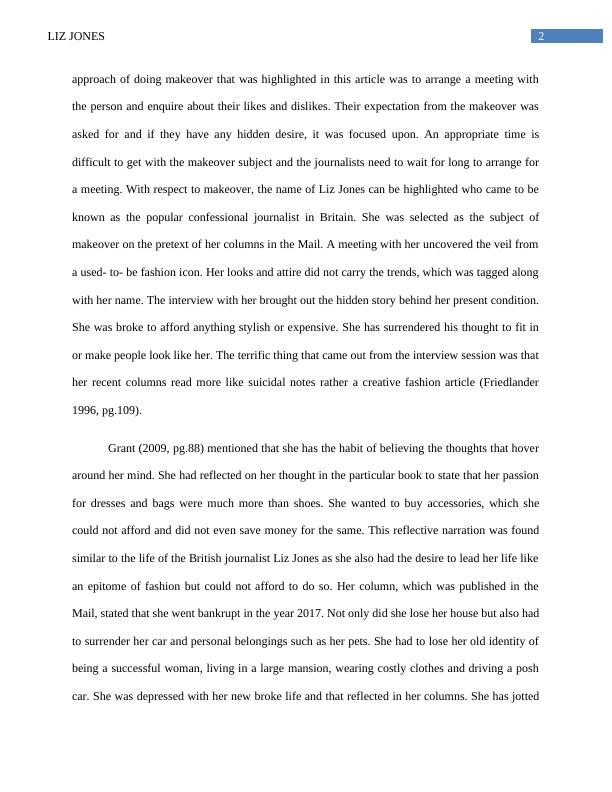Liz Jones: A British Journalist and Her Struggle with Fashion Industry
Added on 2023-06-13
7 Pages1897 Words155 Views
Running head: LIZ JONES
Liz Jones
Name of the student:
Name of the university:
Author note
Liz Jones
Name of the student:
Name of the university:
Author note

1LIZ JONES
Elizabeth Ann Jones or Liz Jones is a British journalist who was born on 5 September
1958. She has started as a fashion journalist but later turned into confessional writing. Jones was
always recognized as a fierce and natural writer; however, she did not miss to receive criticism
too. Initially she was the editor of Marie Claire and a staff of both The Sunday Times and the
Evening Standard. At present, she is a columnist in the Daily Mail and the Mail on Sunday. She
claimed that the fashion industry did not like her and paid no heed to her. Her writing skills
earned her the recognition of Columnist of the Year at the British Society of Magazine Editors
Awards.
According to Bradford (2014, pg.14) the glossy fashion magazines such as Vogue or Elle
or the newcomers Grazia and Look depict the picture of fashion journalism. The expanding
platforms of journalism and the craze for the same, the fashion journalists have a huge
opportunity to display their talent. In the current scenario, the leading newspapers and magazines
require writers who can work in various platforms. There are emerging posts for the online
editors whereas the mushrooming newspaper add-ons require freelance donations. The
magazines targeted at the women such as Company or Marie Claire are comparatively more
stylist which use short pieces and captions for ornamentation. On the light of this, the works of
Liz Jones can be illuminated. She used to write books, columns and articles on the about
personal and intimate information of her life. This behavior towards her work had led to outrage
among her family, friends and the readers in general. Her forward writing against the
campaigning of underweight models and corruption within the beauty sector resulted in sacking
her from Marie Claire.
Dingemans (1999, pg.37) countered that the significant and underlying factor of
makeover is open communication with the person irrespective of a celebrity or a reader. The
Elizabeth Ann Jones or Liz Jones is a British journalist who was born on 5 September
1958. She has started as a fashion journalist but later turned into confessional writing. Jones was
always recognized as a fierce and natural writer; however, she did not miss to receive criticism
too. Initially she was the editor of Marie Claire and a staff of both The Sunday Times and the
Evening Standard. At present, she is a columnist in the Daily Mail and the Mail on Sunday. She
claimed that the fashion industry did not like her and paid no heed to her. Her writing skills
earned her the recognition of Columnist of the Year at the British Society of Magazine Editors
Awards.
According to Bradford (2014, pg.14) the glossy fashion magazines such as Vogue or Elle
or the newcomers Grazia and Look depict the picture of fashion journalism. The expanding
platforms of journalism and the craze for the same, the fashion journalists have a huge
opportunity to display their talent. In the current scenario, the leading newspapers and magazines
require writers who can work in various platforms. There are emerging posts for the online
editors whereas the mushrooming newspaper add-ons require freelance donations. The
magazines targeted at the women such as Company or Marie Claire are comparatively more
stylist which use short pieces and captions for ornamentation. On the light of this, the works of
Liz Jones can be illuminated. She used to write books, columns and articles on the about
personal and intimate information of her life. This behavior towards her work had led to outrage
among her family, friends and the readers in general. Her forward writing against the
campaigning of underweight models and corruption within the beauty sector resulted in sacking
her from Marie Claire.
Dingemans (1999, pg.37) countered that the significant and underlying factor of
makeover is open communication with the person irrespective of a celebrity or a reader. The

2LIZ JONES
approach of doing makeover that was highlighted in this article was to arrange a meeting with
the person and enquire about their likes and dislikes. Their expectation from the makeover was
asked for and if they have any hidden desire, it was focused upon. An appropriate time is
difficult to get with the makeover subject and the journalists need to wait for long to arrange for
a meeting. With respect to makeover, the name of Liz Jones can be highlighted who came to be
known as the popular confessional journalist in Britain. She was selected as the subject of
makeover on the pretext of her columns in the Mail. A meeting with her uncovered the veil from
a used- to- be fashion icon. Her looks and attire did not carry the trends, which was tagged along
with her name. The interview with her brought out the hidden story behind her present condition.
She was broke to afford anything stylish or expensive. She has surrendered his thought to fit in
or make people look like her. The terrific thing that came out from the interview session was that
her recent columns read more like suicidal notes rather a creative fashion article (Friedlander
1996, pg.109).
Grant (2009, pg.88) mentioned that she has the habit of believing the thoughts that hover
around her mind. She had reflected on her thought in the particular book to state that her passion
for dresses and bags were much more than shoes. She wanted to buy accessories, which she
could not afford and did not even save money for the same. This reflective narration was found
similar to the life of the British journalist Liz Jones as she also had the desire to lead her life like
an epitome of fashion but could not afford to do so. Her column, which was published in the
Mail, stated that she went bankrupt in the year 2017. Not only did she lose her house but also had
to surrender her car and personal belongings such as her pets. She had to lose her old identity of
being a successful woman, living in a large mansion, wearing costly clothes and driving a posh
car. She was depressed with her new broke life and that reflected in her columns. She has jotted
approach of doing makeover that was highlighted in this article was to arrange a meeting with
the person and enquire about their likes and dislikes. Their expectation from the makeover was
asked for and if they have any hidden desire, it was focused upon. An appropriate time is
difficult to get with the makeover subject and the journalists need to wait for long to arrange for
a meeting. With respect to makeover, the name of Liz Jones can be highlighted who came to be
known as the popular confessional journalist in Britain. She was selected as the subject of
makeover on the pretext of her columns in the Mail. A meeting with her uncovered the veil from
a used- to- be fashion icon. Her looks and attire did not carry the trends, which was tagged along
with her name. The interview with her brought out the hidden story behind her present condition.
She was broke to afford anything stylish or expensive. She has surrendered his thought to fit in
or make people look like her. The terrific thing that came out from the interview session was that
her recent columns read more like suicidal notes rather a creative fashion article (Friedlander
1996, pg.109).
Grant (2009, pg.88) mentioned that she has the habit of believing the thoughts that hover
around her mind. She had reflected on her thought in the particular book to state that her passion
for dresses and bags were much more than shoes. She wanted to buy accessories, which she
could not afford and did not even save money for the same. This reflective narration was found
similar to the life of the British journalist Liz Jones as she also had the desire to lead her life like
an epitome of fashion but could not afford to do so. Her column, which was published in the
Mail, stated that she went bankrupt in the year 2017. Not only did she lose her house but also had
to surrender her car and personal belongings such as her pets. She had to lose her old identity of
being a successful woman, living in a large mansion, wearing costly clothes and driving a posh
car. She was depressed with her new broke life and that reflected in her columns. She has jotted

End of preview
Want to access all the pages? Upload your documents or become a member.
Related Documents
The Role of UK Fashion Industrylg...
|6
|1756
|118
